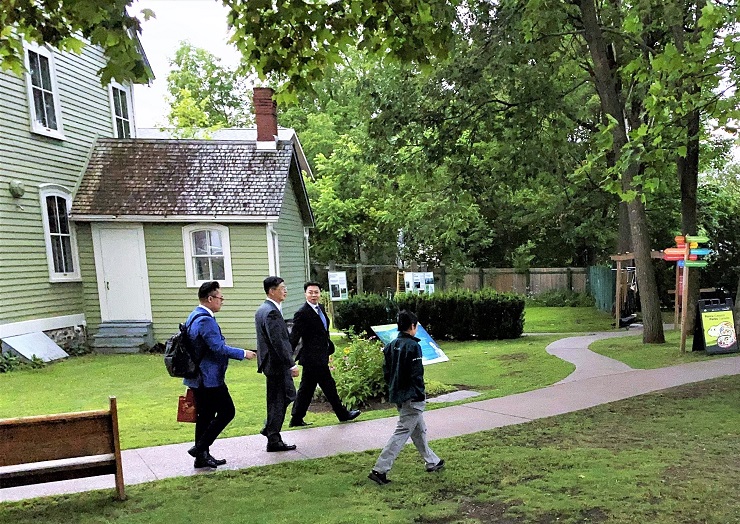PART 2: MY INTERVIEW WITH CHINA’S AMBASSADOR TO CANADA AS HE TALKS ABOUT CLIMATE CHANGE
Mark Clairmont | MuskokaTODAY.com
GRAVENHURST — “I believe people here should discard this kind of mentality about China is a threat. Actually China is an opportunity, because Canada benefits a lot from its exports to China,” says Chinese ambassador Cong Peiwu.
“And for China and Canada, we can work on a lot of issues as I mentioned earlier — climate change, bio-diversity.”
During a rare visit to Gravenhurst’s Bethune House and in an interview with MuskokaTODAY.com that offered further glimpses into Chinese thought, Cong spoke (among other timely topics) about climate change and “China’s reliance on fossil fuels.”
“President Xi (Jinping) says he believes in climate change,” I told Cong that the West has been assured. “Is China looking at other alternative ways like solar and wind? And will they decrease use of fossil fuels?”
In reply, Cong said: “That’s exactly what we are doing.”
So why do Canadians believe differently?

“Because it’s like other stories. They don’t have a clear picture,” said Cong. “I will tell you what, President Xi himself pays a lot attention to environmental protection, to climate change for the peoples, our children, our grandchildren. Not only for Chinese people. Climate change is a global challenge. We are doing that together with other countries to make sure we are leaving a better environment for our children, our grandchildren not only in China but the whole world.”
The ambassador defended his country’s climate record saying they have “signed on to many international (environmental) conventions and treaties, like the Paris Agreement (1915). We are among the very few major economies to take part in the event.
“As for the fossil fuel, the fossil energy, in the past we relied heavily on that. But the pattern has changed drastically. So in the past coal was one of our major consumptions. Now days it has decreased.”
Asked by how much, he said: “Twenty years ago for the whole consumption of energy it was like 72 per cent for coal. And now it’s just above 55 per cent. So you can see the decrease.”
And what was coal replaced with? Nuclear?
“It’s replaced with renewable energy. Mainly solar and wind and hydro. So whether it is solar and wind and hydro, we are now the No. 1 for all those capacity worldwide. And for those newly installed capacities, the renewable energy has already surpassed the traditional one. Actually for renewable energy parts, more than 50 per cent of the owners are in China. So seven years in a row China is the largest producer and seller of renewable energy parts. That also helps a lot reducing our carbon emissions.
“Our aim is to make sure China will strive to achieve carbon emission peak by 2030 — and carbon neutrality. And between the carbon emissions peak to carbon neutrality only 30 years.”
By comparison, he said, “for European countries it’s more than 70 years; and for the United States it’s more than 40 years. So for China’s it’s a very, very ambitious plan. But I know we are going through some challenges for that.
“But as you mentioned, it’s not like that politicians are saying one thing — and on the ground we are doing another thing. It’s not like that. Our leadership says something and we will do our best to deliver on that. So we will fulfill our commitment. But also in this area I believe China and Canada can cooperate.”
On the issues of super powers, the U.S. and hegemony …
In 2014, Cong became head of the Department of North American and Oceanian Affairs of the Ministry of Foreign Affairs of the People’s Republic of China. He also served as counsellor of the Chinese Embassy in Britain.
Also this past February Cong was summoned by Global Affairs Canada officials after a balloon of Chinese origin crossed into Canadian and American airspace.
So I asked him about new world order influence in 2023 among Americans, Chinese and Russians.
“We don’t want to see this rivalry among major powers. Because there is no intention for us to seek hegemony of our power politics or secure our influence. For us we want to live peacefully with all the other countries on the basis of mutual respect. On the basis of equality.
“Because for us whether a country big or small, strong or weak, we believe it is an equal member of our international community. So whether it is the United States or an island country in the Pacific we treat them equally.
“But of course for China and the United States, two major economies in the world, if their relations improve we can do a lot of things to also tackle all those global issues and challenges. We believe that China-U.S.relations should be guided by the principles of mutual respect, peaceful co-existence and cooperation. So that is our policy.”

Trade, jobs and Donald Trump’s
‘Make America Great’ ‘uni-nationalism’
“It’s a market economy. We are arguing this is a time of globalization; a local globalization encounters some headwinds. But it is still there, this can not be reversed. A lot of products are not made in one country. Maybe one country assembles, but the parts are coming different countries and regions. So we believe in free trade. We believe in true multi-lateralism.
“But for the United States it says that it is in favour of free trade, but what it is doing is protectionism, it’s uni-nationalism. It’s putting other countries on the sanction list. Now days every week, almost every week, it puts some Chinese people, persons and entities on the sanction list. So we believe our country — whether it’s the United States, Canada or other countries — we should come together to help those trans-national issues. To seek common ground while reserving differences. That’s more important.”
Cong went on to comment on former U.S. President Donald Trump’s “Make America Great’ campaign to bring back jobs from China.
“I think that also the person, some persons in the United States, were trying to shirk the responsibility to China. Everything happening in the United States — the bad things about the loss of jobs. But actually it’s not China’s fault. Because (the U.S.) stopped the production lines for this kind of products, the manufactured goods. So they are not producing these products anymore. And if they don’t import from China, they import from elsewhere. But because China we have the quality and relatively inexpensive products. So that’s why the American consumers they love to buy these Chinese products.
“And actually, also, our investment in the United States, our trade with the United States, helped create a lot of quality jobs in the U.S. I think in recent years there have been several million jobs directly or indirectly associated with Chinese investment or Chinese trade with the U.S.
“It’s also the case between China and Canada. China’s investment this way also helps local communities to have quality jobs. Like our energy companies operating here in Alberta. Even at the very difficult years like 2015, the prices were very low at the time. A lot of energy companies withdrew their operations from Canada, like the United States. They simply turned away from Canada. Our companies still managed to stay here to still make sure they were contributing to the job opportunities in Canada.”
* Next up, tomorrow, Cong talks more about Canada and global scrutiny, and
about Chinese treatment workers and humanitarian concerns over Uighurs.
See Part 1 of my interview below:
CHINA NO ‘THREAT’ TO CANADA, COUNTRIES CAN WORK ‘TOGETHER,’ SAYS AMBASSADOR CONG https://muskokatoday.com/2023/07/china-no-threat-to-canada-countries-can-work-together-says-ambassador-cong/
EMAIL: news@muskokatoday.com
30th year of ‘Local Online Journalism’
Twitter: @muskokatoday, Facebook: mclairmont1
Leave comments at end of story
SUBSCRIBE for $25 by e-transferring to news@muskokatoday.com
Or go online to https://muskokatoday.com/subscriptions
